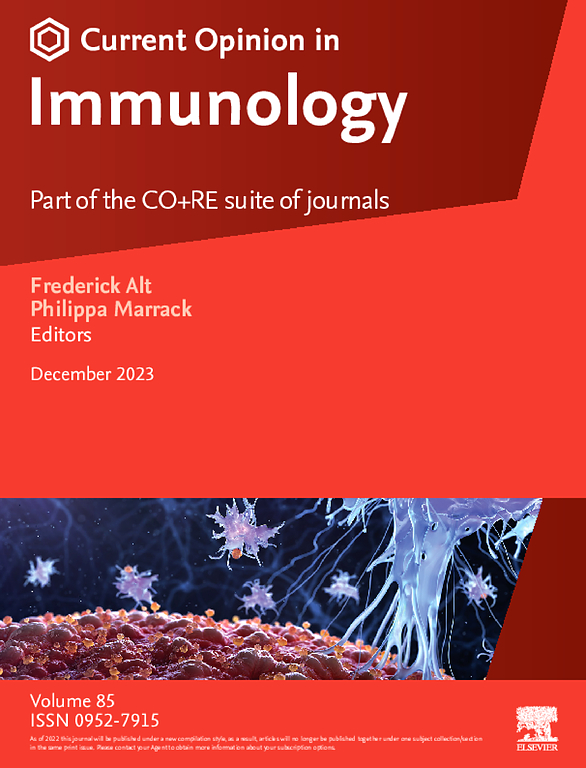Functional subsets of tumor-specific CD8+ T cells in draining lymph nodes and tumor microenvironment
IF 6.6
2区 医学
Q1 IMMUNOLOGY
引用次数: 0
Abstract
Accumulating evidence demonstrates that tumor-specific CD8+ T cells in tumor-draining lymph nodes (TdLNs) act as an upstream reservoir of exhausted subsets within tumor microenvironment (TME). This reservoir primarily consists of progenitor exhausted CD8+ T (TPEX) cells and newly defined tumor-specific memory subsets (TTSM). We propose that these two subsets work together to mediate the antitumor effects of PD-1/PD-L1 immune checkpoint blockade (ICB) in a spatiotemporal manner. Although PD-1/PD-L1 ICB monotherapy drives the proliferation and further differentiation of these subsets, it does not alter the programmed differentiation trajectory from TTSM cells to TPEX cells, ultimately leading to the development of terminally exhausted CD8+ T cells. This phenomenon may partly explaining the frequent relapse in patients following initial ICB therapy. In this review, we focus on the phenotypic and functional heterogeneity of tumor-specific CD8+ T cells in both TdLNs and the TME and discuss the implications of these studies for ICB. Our insights aim to illuminate new strategies for advancing tumor immunotherapies.
引流淋巴结和肿瘤微环境中的肿瘤特异性 CD8+ T 细胞功能亚群
越来越多的证据表明,肿瘤引流淋巴结(TdLNs)中的肿瘤特异性 CD8+ T 细胞是肿瘤微环境(TME)中衰竭亚群的上游储库。这个储库主要由原代衰竭 CD8+ T(TPEX)细胞和新定义的肿瘤特异性记忆亚群(TTSM)组成。我们提出,这两个亚群以时空方式共同介导 PD-1/PD-L1 免疫检查点阻断(ICB)的抗肿瘤效应。虽然PD-1/PD-L1 ICB单药治疗能促进这些亚群的增殖和进一步分化,但它并不能改变从TTSM细胞到TPEX细胞的程序化分化轨迹,最终导致CD8+ T细胞的终末衰竭。这一现象可能部分解释了患者在接受初始 ICB 治疗后频繁复发的原因。在这篇综述中,我们重点探讨了 TdLN 和 TME 中肿瘤特异性 CD8+ T 细胞的表型和功能异质性,并讨论了这些研究对 ICB 的影响。我们的见解旨在阐明推进肿瘤免疫疗法的新策略。
本文章由计算机程序翻译,如有差异,请以英文原文为准。
求助全文
约1分钟内获得全文
求助全文
来源期刊
CiteScore
13.30
自引率
1.40%
发文量
94
审稿时长
67 days
期刊介绍:
Current Opinion in Immunology aims to stimulate scientifically grounded, interdisciplinary, multi-scale debate and exchange of ideas. It contains polished, concise and timely reviews and opinions, with particular emphasis on those articles published in the past two years. In addition to describing recent trends, the authors are encouraged to give their subjective opinion of the topics discussed.
In Current Opinion in Immunology we help the reader by providing in a systematic manner: 1. The views of experts on current advances in their field in a clear and readable form. 2. Evaluations of the most interesting papers, annotated by experts, from the great wealth of original publications.
Current Opinion in Immunology will serve as an invaluable source of information for researchers, lecturers, teachers, professionals, policy makers and students.
Current Opinion in Immunology builds on Elsevier''s reputation for excellence in scientific publishing and long-standing commitment to communicating reproducible biomedical research targeted at improving human health. It is a companion to the new Gold Open Access journal Current Research in Immunology and is part of the Current Opinion and Research(CO+RE) suite of journals. All CO+RE journals leverage the Current Opinion legacy-of editorial excellence, high-impact, and global reach-to ensure they are a widely read resource that is integral to scientists'' workflow.

 求助内容:
求助内容: 应助结果提醒方式:
应助结果提醒方式:


